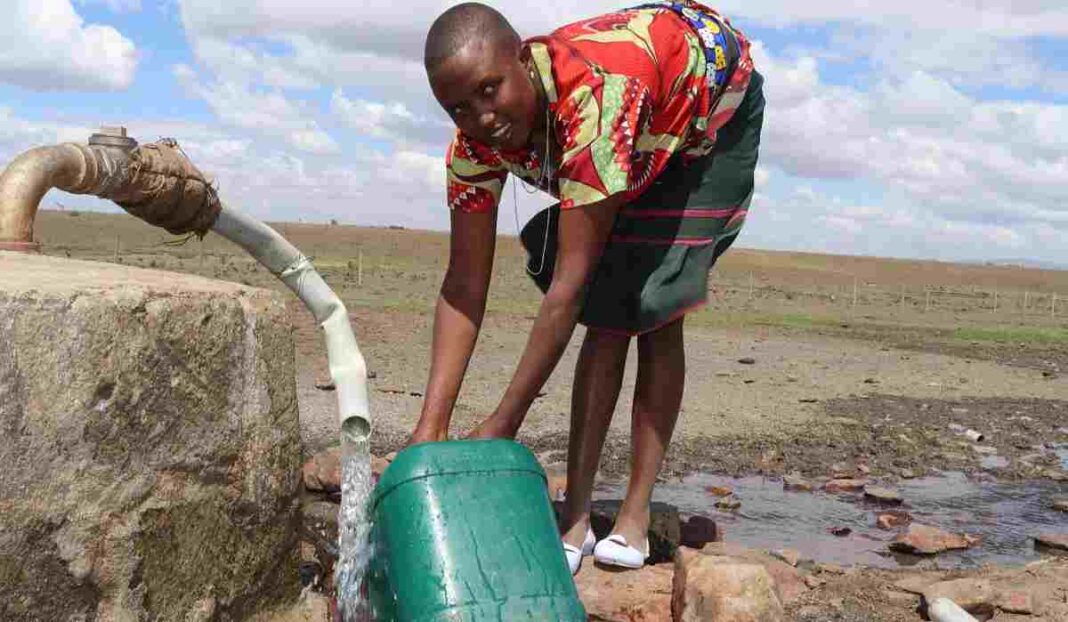KENYA: The wind blows with immense strength at Tanki Nyeusi village in Kenya’s Laikipia County as Nelius Lemiruni washes the dishes outside her makeshift house before she walks down to the school compound to fetch water.
The 22-year-old mother of four moved here to the village just over a month ago after a borehole was sunk within the school compound, ending their struggle for water.
“We used to walk five kilometres and back to get water, and that was only for a single 20-litre jerry can of water that would not be enough for my household’s use, including even drinking,” Lemiruni says.
She represents a struggle many people, especially in northern Kenya, go through to access clean drinking water. Well-wishers have come to their rescue, bringing hope with every drop of water. For the first time since she was born, Lemiruni can now smile at the thought and sight of very clean, potable water just at her disposal, something she says she’d never dreamed of.
The borehole at the school was drilled by Well Aware, a non-profit working in East Africa to bring water to communities.
Well Aware helping Kenya to access clean water
The organisation was started by Sarah Evans, a corporate lawyer who was asked to help with a project in Kenya to help raise funding for cattle and goats for a Maasai village. In 2007, Kenya was experiencing one of its worst recorded droughts, and the livestock in rural communities—their livelihood—was diminishing.
But, once Sarah researched the problem, she realised the source of this devastating issue was a lack of water, so she insisted on drilling a well there, instead, a solution that could potentially solve the livestock problem, as well as the many other growing and life-threatening challenges the entire region was facing.
After raising funds needed for that water well, Sarah travelled to Kenya in 2010 to see the first well drilled—an experience that changed her life after she saw first-hand what clean drinking water can do for one’s life.
From the joy of the community when they received clean water, Sarah understood her purpose. Aware has provided clean water to over 350,000 people in East Africa.
To ensure a steady supply, the non-profit has partnered with the water sector tech company, Well Beyond. The collaboration is done to develop a mobile application called Well Beyond that is used to monitor and report any issues in the water supply chain.
For example, in the case of pipe leakages, the person responsible reports using the app, and a plumber is sent to fix the pipes. This is done online using the mobile app.
One such user is Lawi Mugambi, a Sweetwaters Girls’ High School teacher in Nanyuki, Laikipia County. Lawi uses the app to report on the condition of the water pipes and the solar system installed to pump out the water into the taps around the school.
“We would be served with two water bowsers in a week by the county government, and this would still need to be more because the water needs were high. The girls (students) would hear the sound of the water bowser entering the school compound, and they would no longer concentrate on their studies as they would scramble for their buckets so they could get some,” Mugambi explains.
He says that installing a borehole at the school has made it easy for the students there, as they can concentrate on their studies and save the time they would spend looking for water in the nearby streams.
The school has also been able to cultivate a kitchen garden to provide vegetables for the students’ meals instead of buying them from the market, sometimes at high prices, especially during the dry seasons.
“When a community discovers that their water system is not working properly, the water committee system manager is dispatched to the water system with their smartphone in hand. The app then leads them through a decision tree to troubleshoot any issues that may be happening and provides step-by-step instructions to help them fix the system and get water running themselves properly,” explains Sarah Evans, Well Aware’s founder and board chair.
Once initially downloaded, the app is fully functional offline, further ensuring accessibility for even the most remote populations in developing regions. Local leaders can even remotely chat with experts in real-time, saving communities days or weeks without their only water source for repairs. It also lengthens the life of the water system and results in significant savings of both time and money.
Laikipia County is a popular tourist spot north of Nairobi, the capital of Kenya. It is in an area of Kenya called Arid and Semi-Arid, which gets less than 600mm of rain a year.
According to the county government, climate change disrupts weather patterns, leading to unpredictable water availability and exacerbating water scarcity. These impacts have affected the quantity of water needed to meet the demand in the county. Even though it has rained a lot over the years, the area around Mount Kenya and the Aberdare forests, where the water comes from, is very dry.
The non-profit said, “This is what it’s working to solve in the next five years.”
“We have seen significant growth over the last year, and we’re really excited about where we’re heading. We’re expanding our project capacity, partnerships, corporate sponsors, and awareness of our work. In the next five years, we expect to provide even more communities with lasting clean water and continue to be the leading non-profit organization maintaining a 100% success rate,” says Evans.
Also Read: Unrest in Haiti Intensifies the Misery as Homes Run Out of Water



